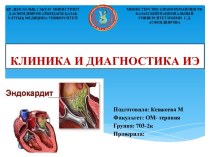- Главная
- Разное
- Бизнес и предпринимательство
- Образование
- Развлечения
- Государство
- Спорт
- Графика
- Культурология
- Еда и кулинария
- Лингвистика
- Религиоведение
- Черчение
- Физкультура
- ИЗО
- Психология
- Социология
- Английский язык
- Астрономия
- Алгебра
- Биология
- География
- Геометрия
- Детские презентации
- Информатика
- История
- Литература
- Маркетинг
- Математика
- Медицина
- Менеджмент
- Музыка
- МХК
- Немецкий язык
- ОБЖ
- Обществознание
- Окружающий мир
- Педагогика
- Русский язык
- Технология
- Физика
- Философия
- Химия
- Шаблоны, картинки для презентаций
- Экология
- Экономика
- Юриспруденция
Что такое findslide.org?
FindSlide.org - это сайт презентаций, докладов, шаблонов в формате PowerPoint.
Обратная связь
Email: Нажмите что бы посмотреть
Презентация на тему СИФИЛИС
Содержание
- 2. Бледные трепонемы - возбудители сифилиса
- 3. Трепонемы
- 4. Трепонемы
- 5. http://info.fujita-hu.ac.jp/~tsutsumi/case/case133.htmБледные трепонемы в межклеточном пространстве
- 6. Возбудитель Сифилиса – Бледная Трепонема Бледная трепонема
- 7. Transmission electron micrograph of Treponema isolated from
- 8. Электронный вид трепонем
- 9. Возбудитель Сифилиса – Бледная Трепонема
- 10. Dark field photomicrograph of Treponema pallidum bacteria.
- 11. Treponema pallidum, IFA
- 14. Диагностика
- 15. Diagnosis of syphilis The definitive diagnosis of
- 17. Treponema hyodysenteriae (возбудитель дизентерии свиней)http://vetfak.nsau.edu.ru/new/uchebnic/microbiology/stu/index_micro.htm
- 18. Treponema hyodysenteriae (возбудитель дизентерии свиней)http://vetfak.nsau.edu.ru/new/uchebnic/microbiology/stu/index_micro.htm
- 20. Врожденный сифилис
- 23. Сифилитическая ангина
- 24. Congenital syphilis, primary and secondary syphilis rates, by year -- United States, 1992-1998. Epidemiology, surveillance.
- 25. Clinical presentation of syphilis
- 27. Первичный сифилис
- 31. Primary and secondary syphilis—Age- and sex-specific rates: United States, 2006
- 34. Сифилис
- 36. Сифилитический шанкр
- 37. Вторичный сифилис
- 39. Вторичный сифилис
- 40. Сифилис вторичный
- 44. Сифилис вторичный
- 46. Сифилис вторичный
- 48. Secondary syphilis - mouth mucosa Bristol Biomedical Archive
- 52. Secondary syphilis manifested perineal condyloma lata lesions,
- 53. Сифилис
- 55. Dürer Syphilis 1496
- 57. Лама
- 58. Primary and secondary syphilis — Rates: Total and by sex: United States, 1987–2006
- 60. Gummas, or soft ”gummy” tumors, are seen
- 61. Гумма
- 62. Yaws is a crippling and disfiguring disease affecting some 50 million people in the world
- 63. A photograph of a patient with tertiary
- 66. Сифилис. Уродства. Model of the head of a patient with tertiary syphilis
- 67. Primary syphilis After an incubation period of
- 68. Reported cases of syphilis by stage of infection: United States, 1941–2006
- 69. Epidemiology of clinically-apparent UTI (upper panel) and asymptomatic bacteriuria (lower panel) according to age and sex.
- 70. Сифилис
- 71. Уровни заболеваемости сифилисом (на 100 тыс. населения)
- 72. Количество случаев врожденного сифилиса по РФ
- 73. Клинические проявленияТвердый шанкр
- 74. Вторичный сифилис(папулы)
- 75. Вторичный сифилис (алопеции)
- 76. Ранний врожденный сифилис
- 78. Скачать презентацию
- 79. Похожие презентации
Бледные трепонемы - возбудители сифилиса

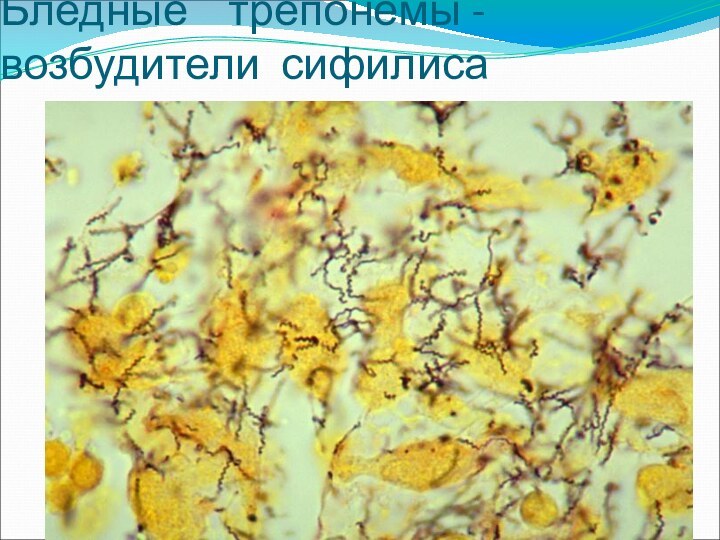
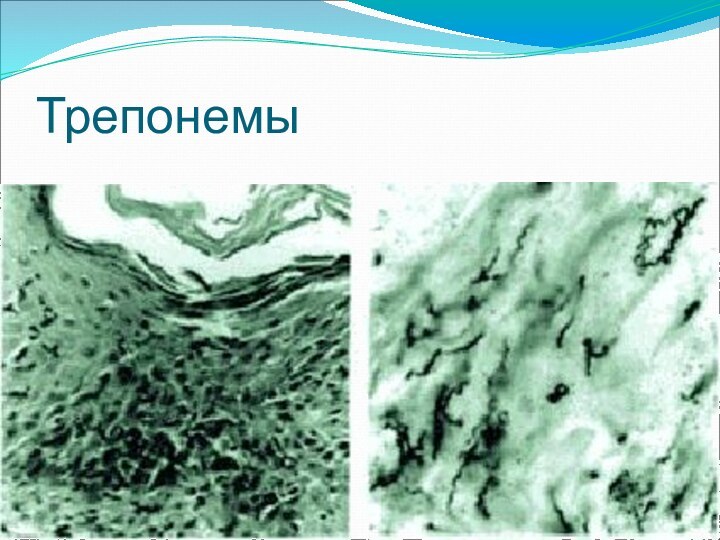
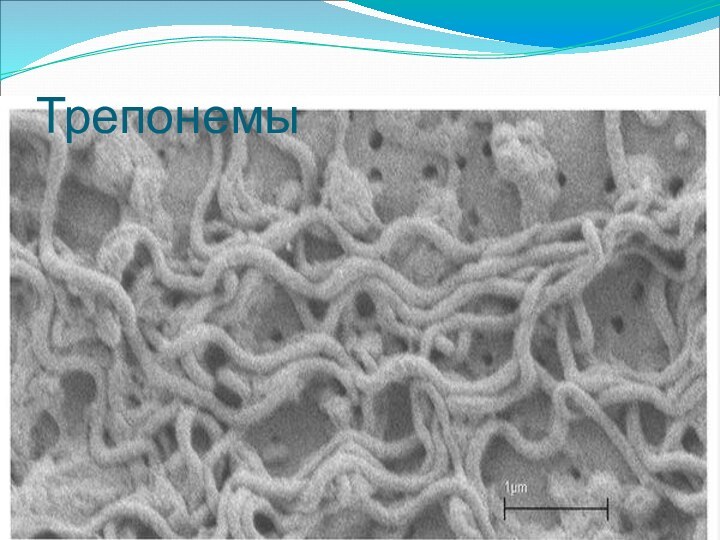
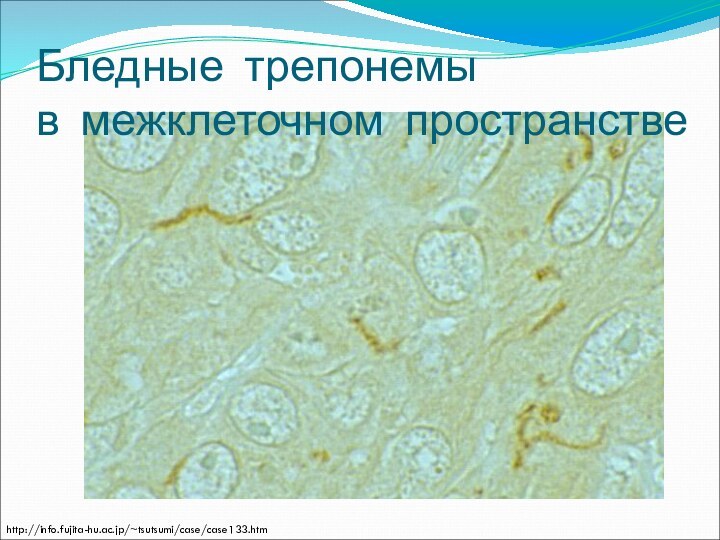
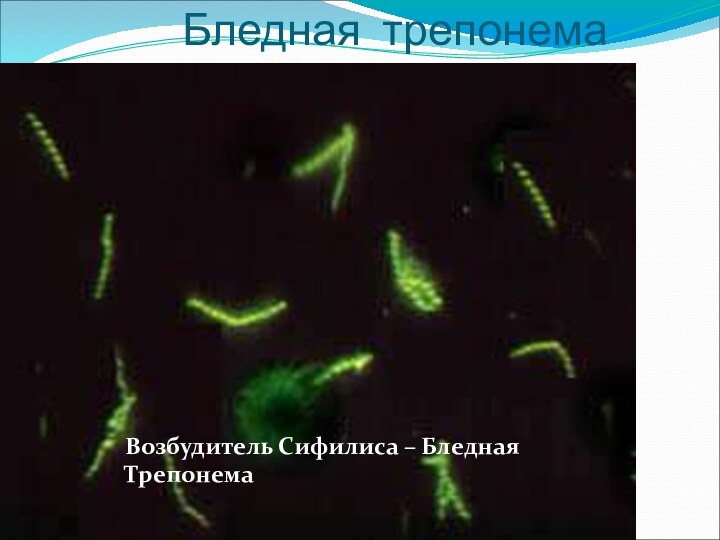
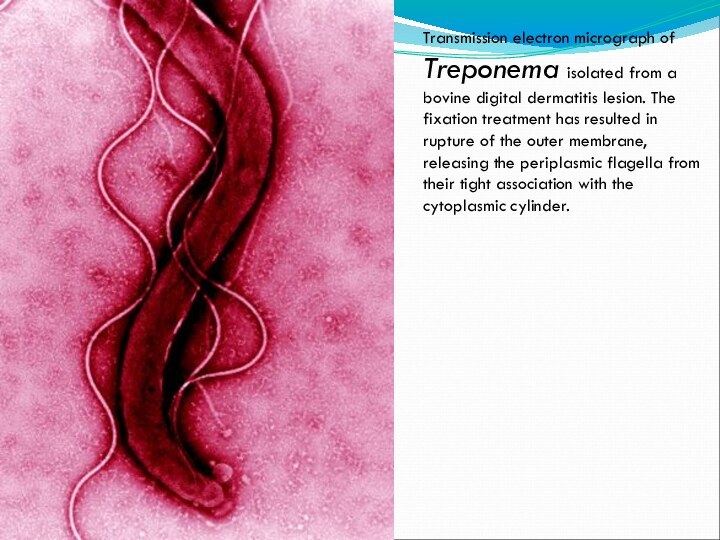
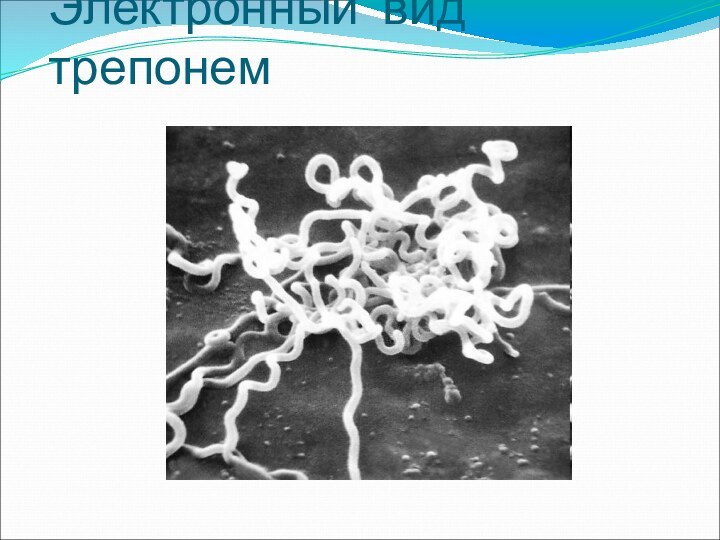
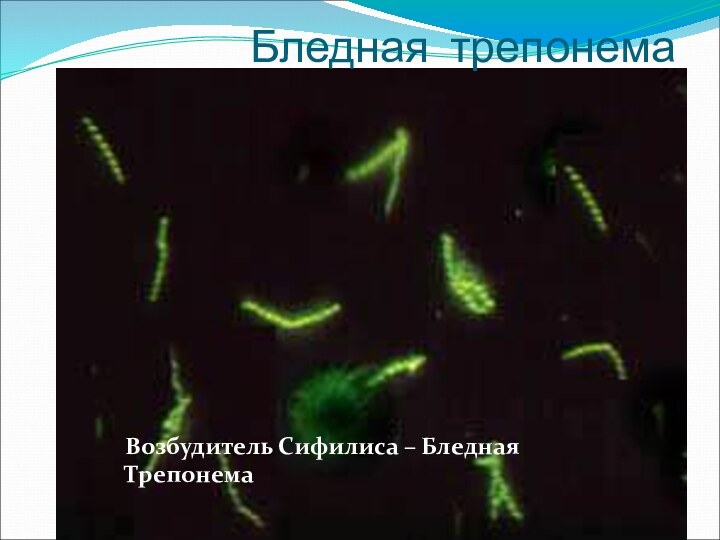
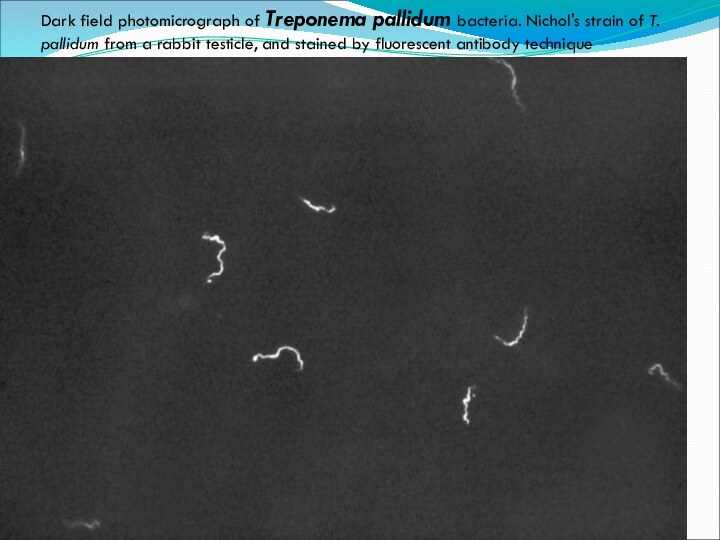
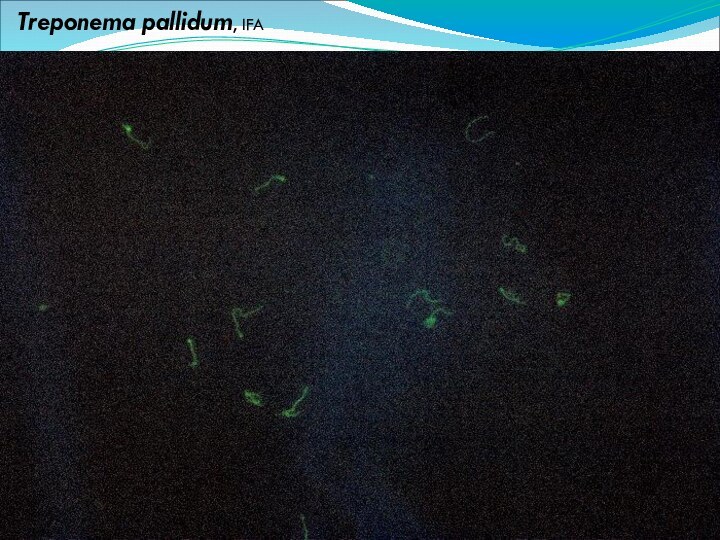
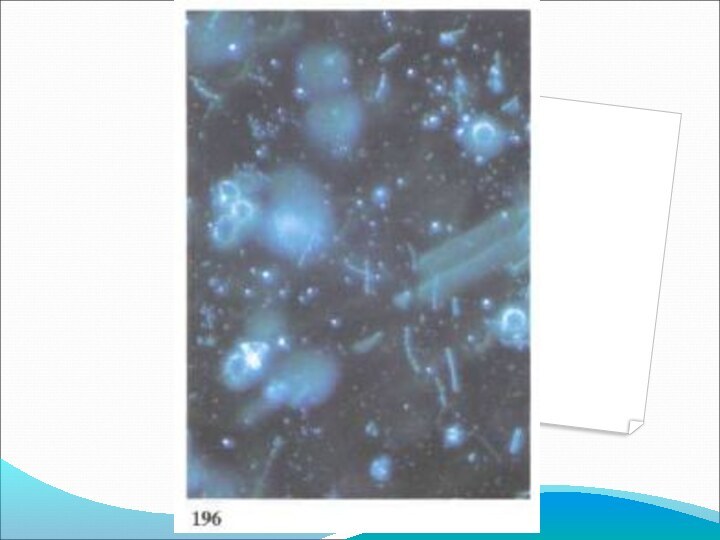
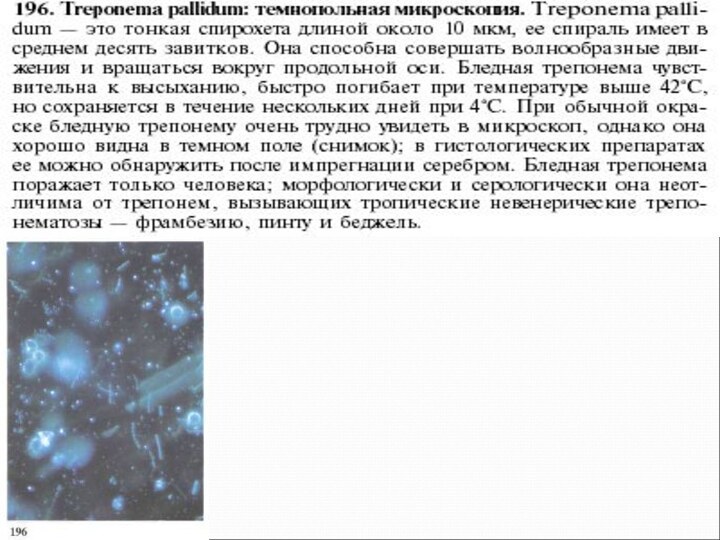

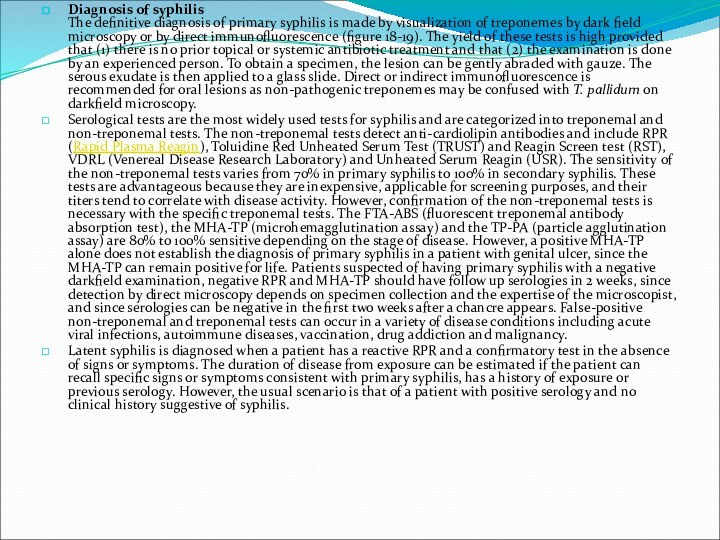
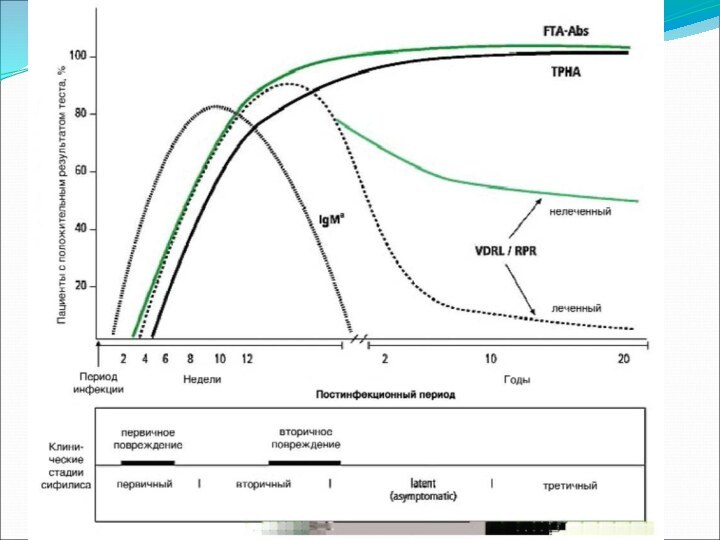
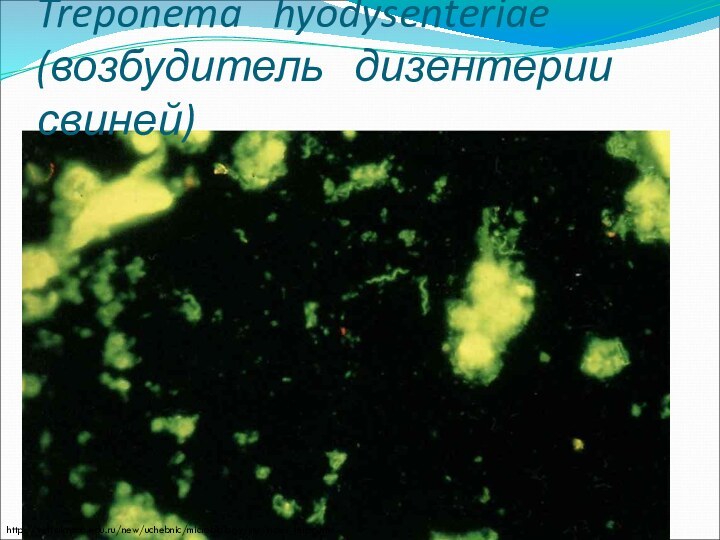
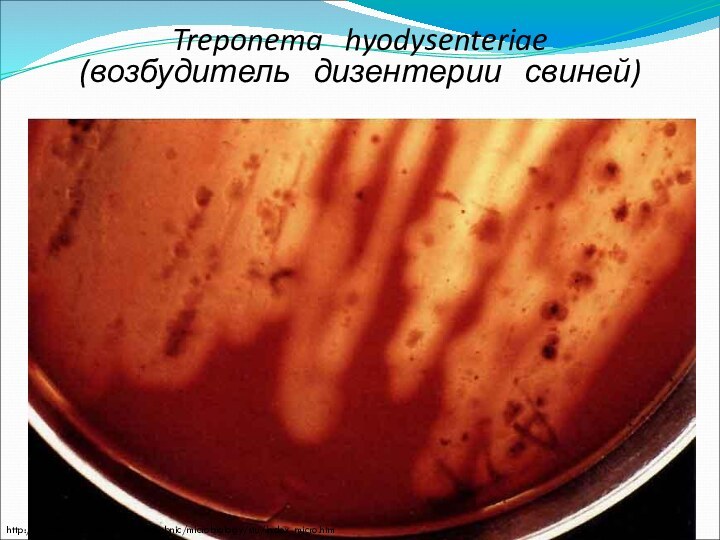
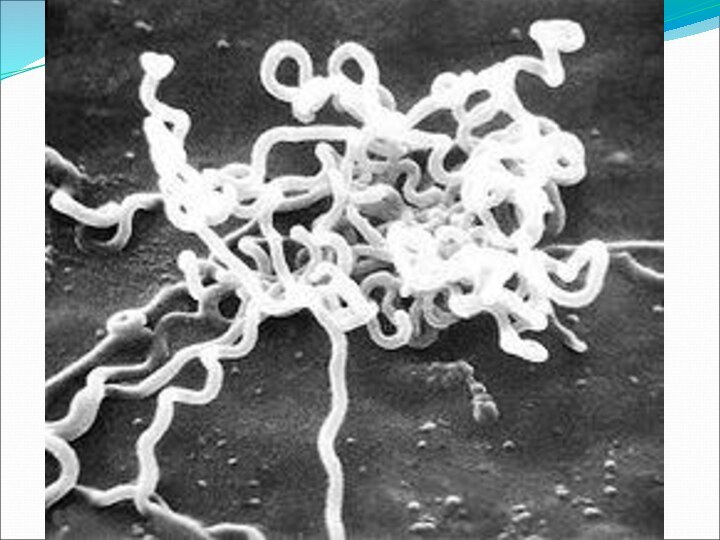

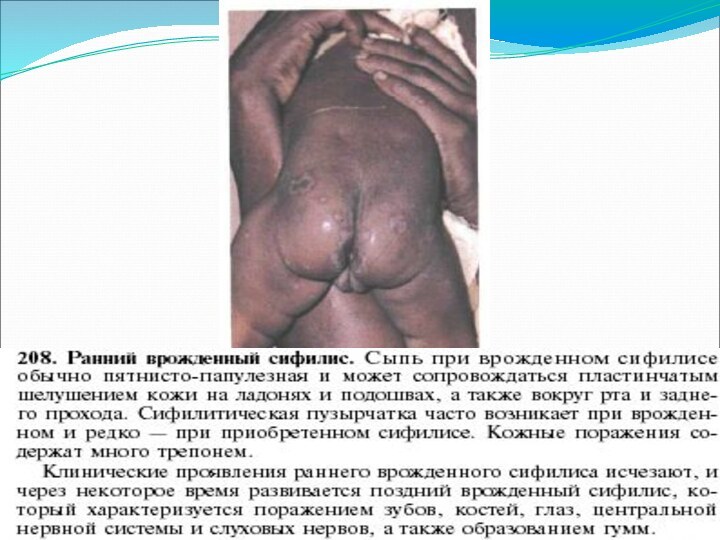

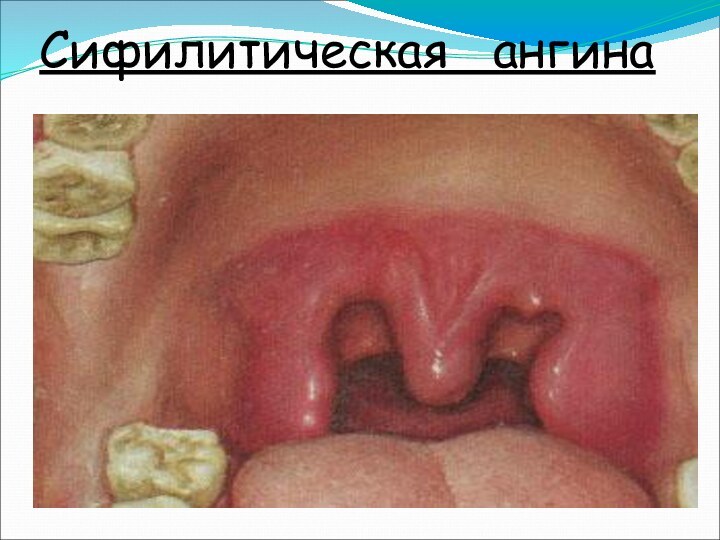
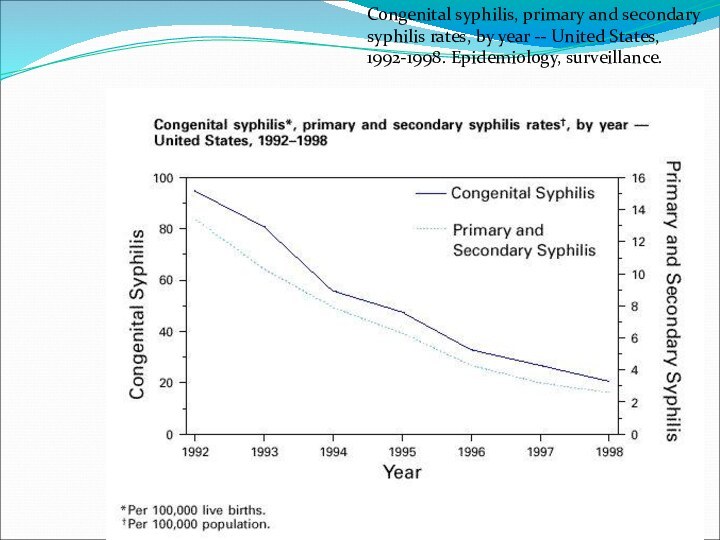
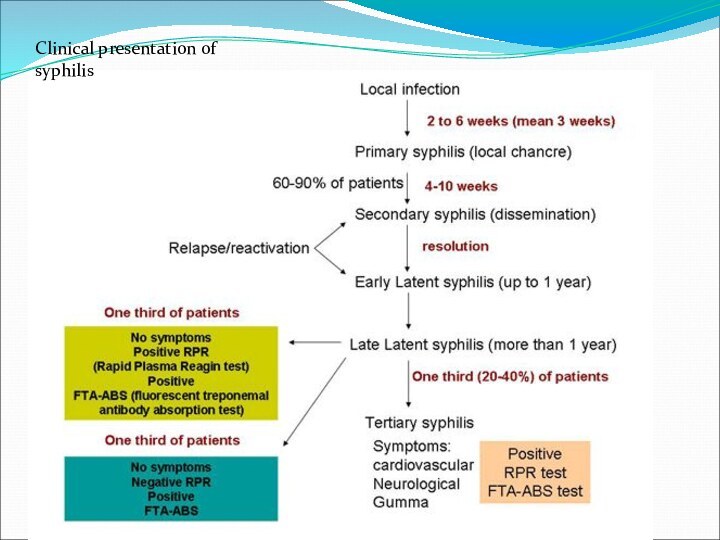
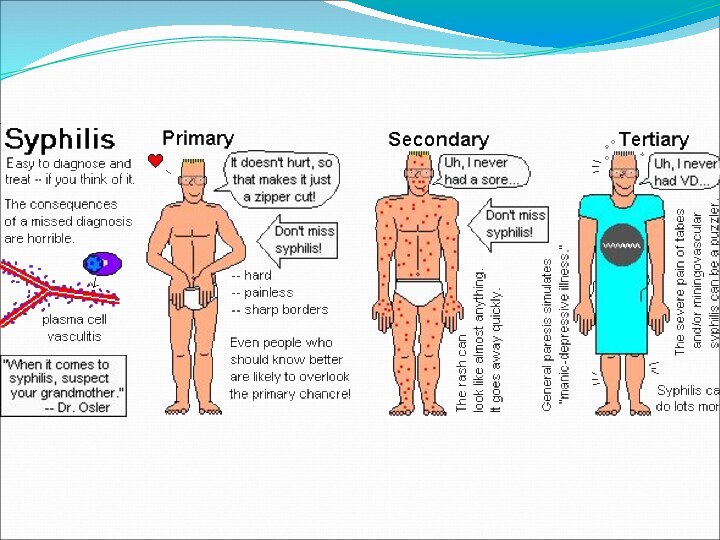
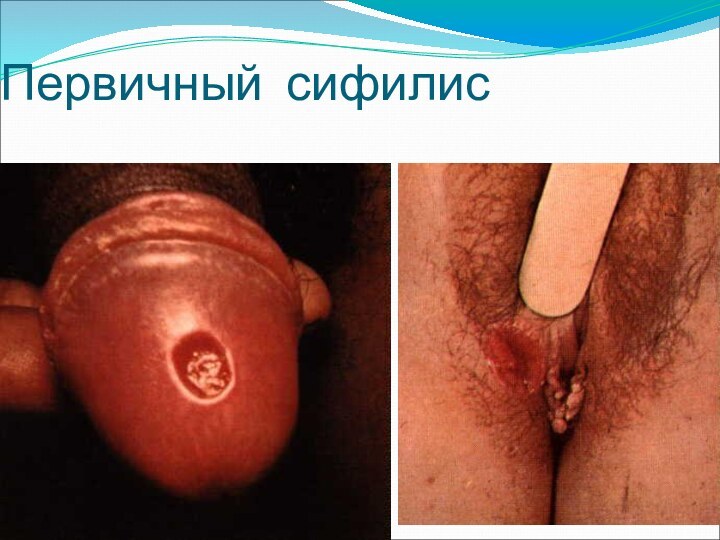
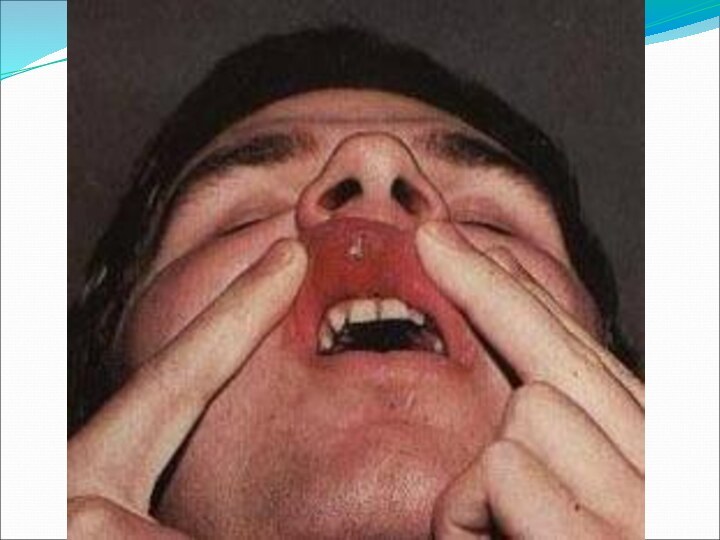
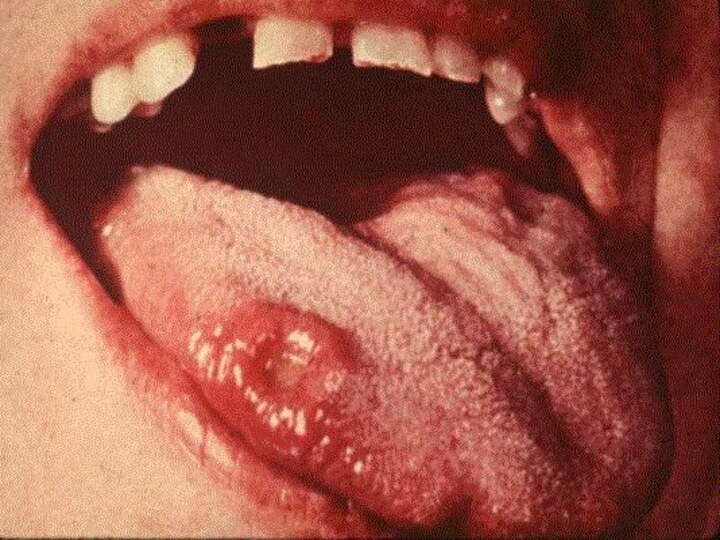

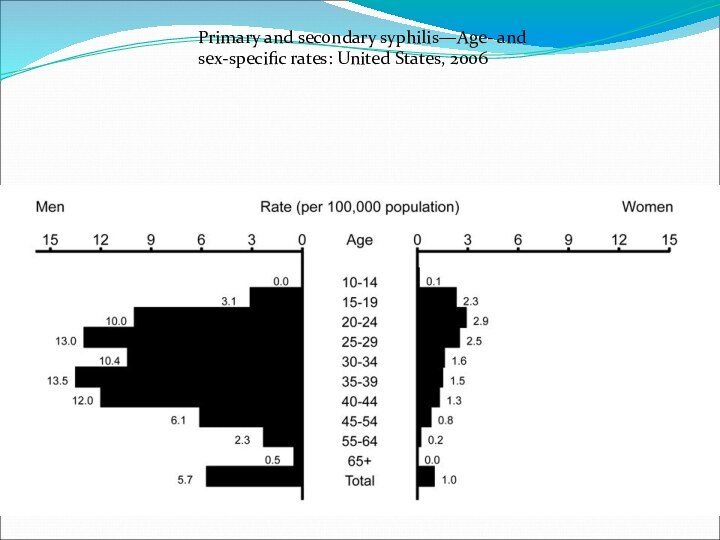

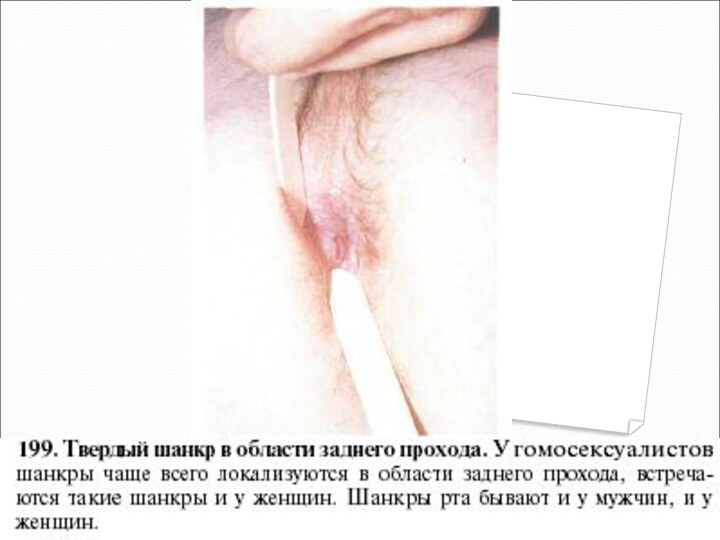
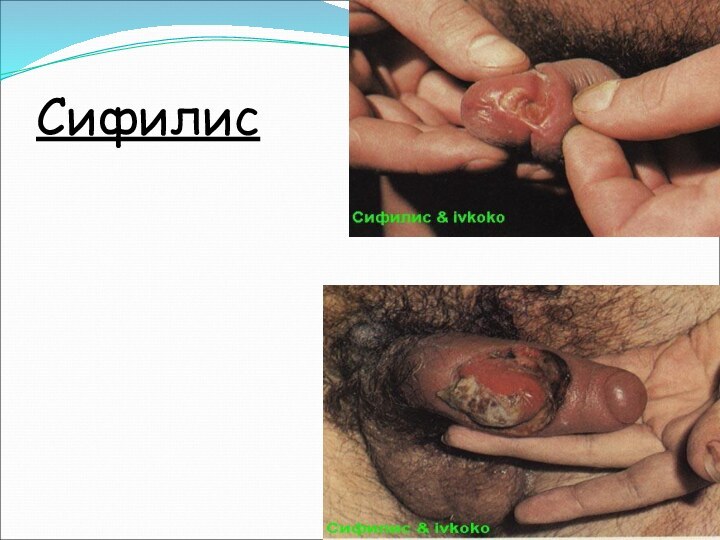
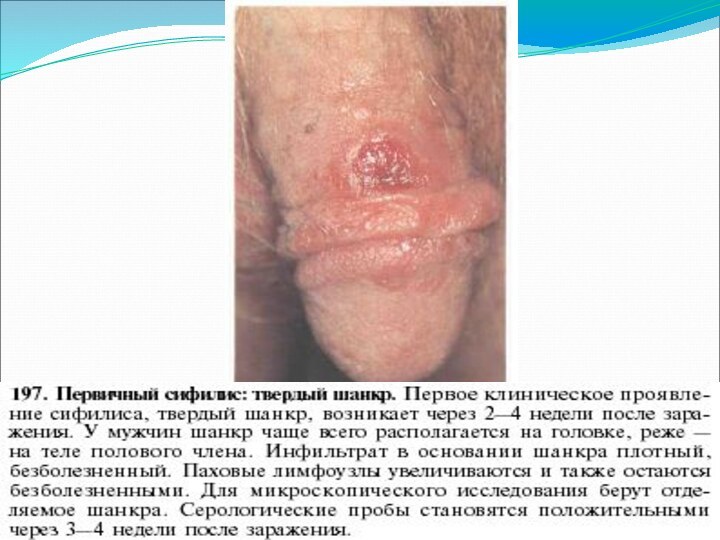
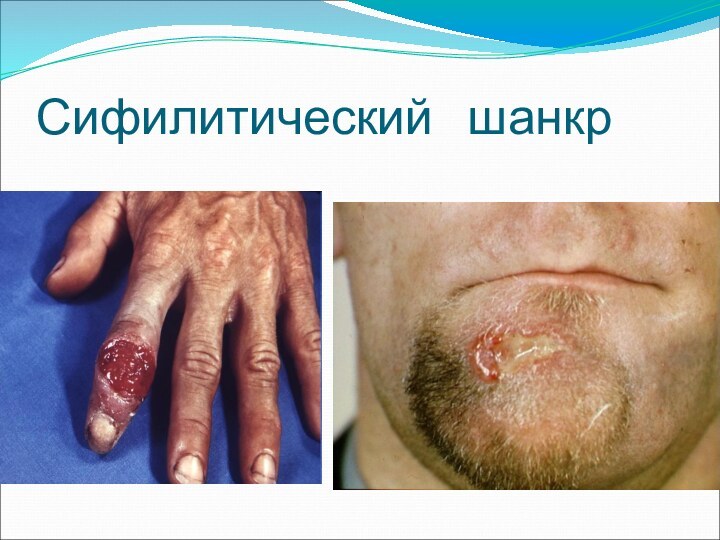


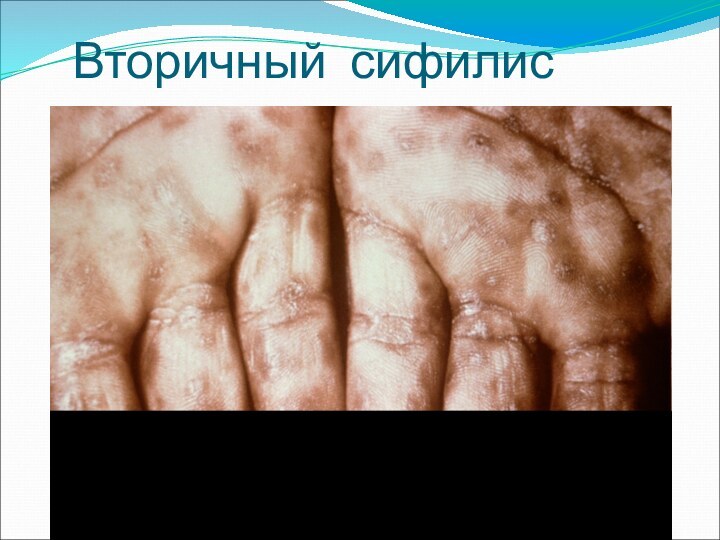
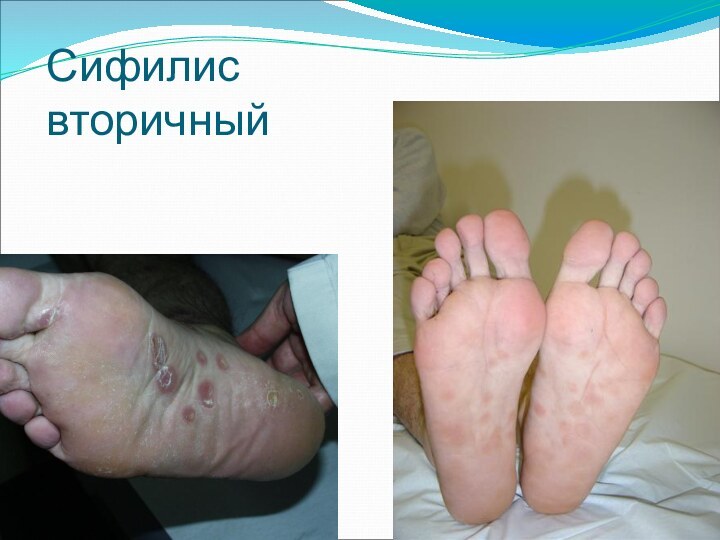
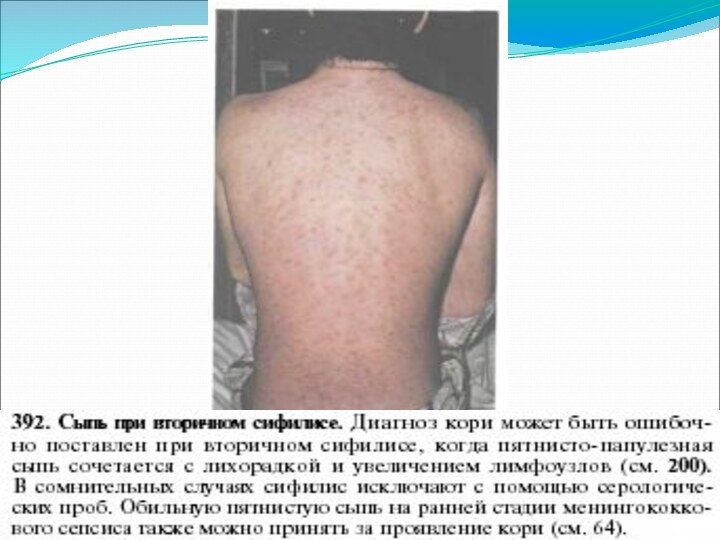
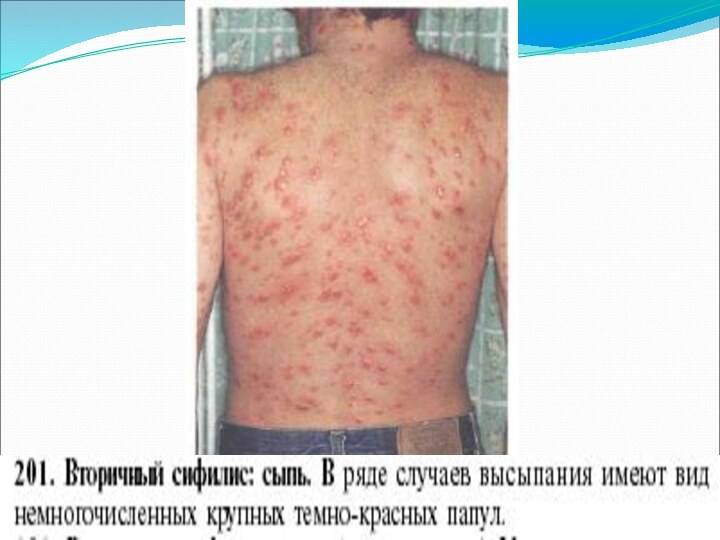
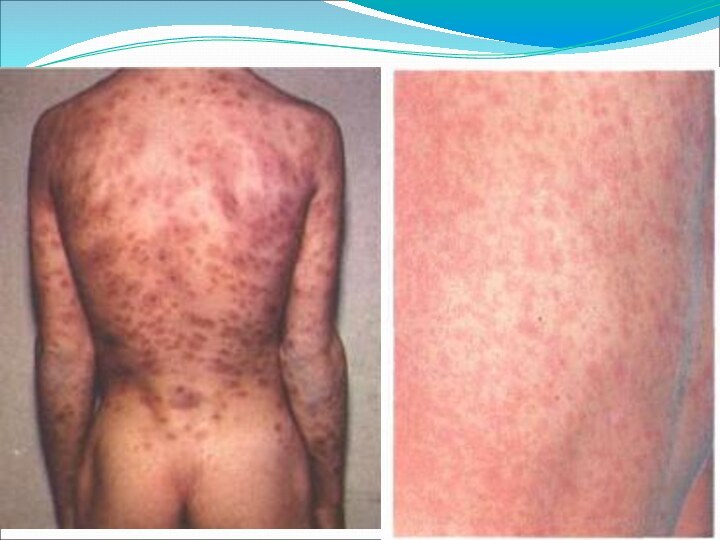
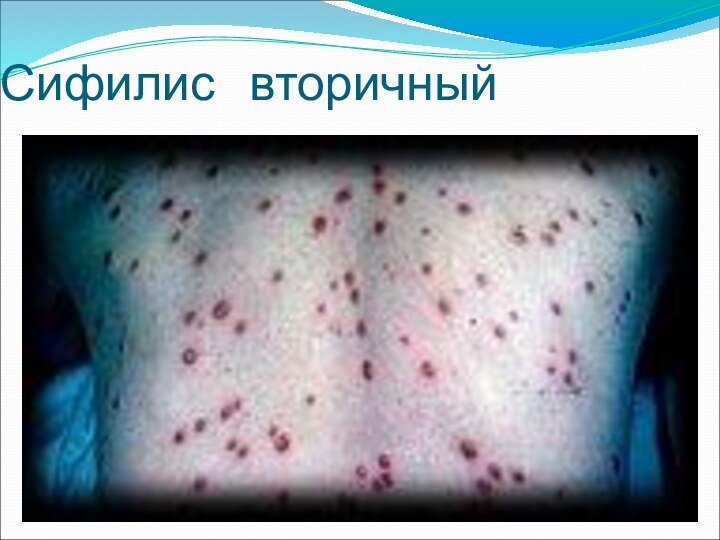

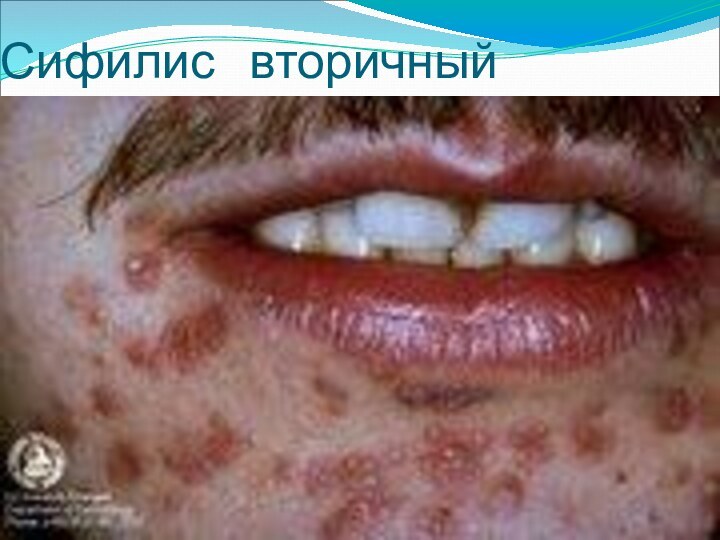
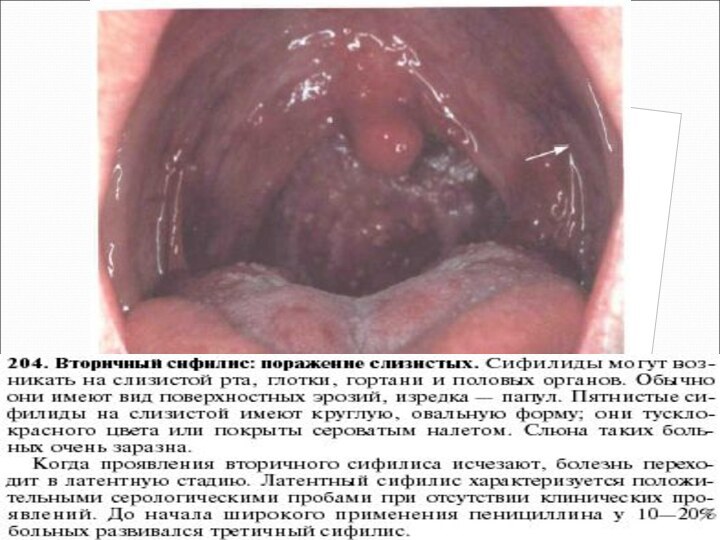
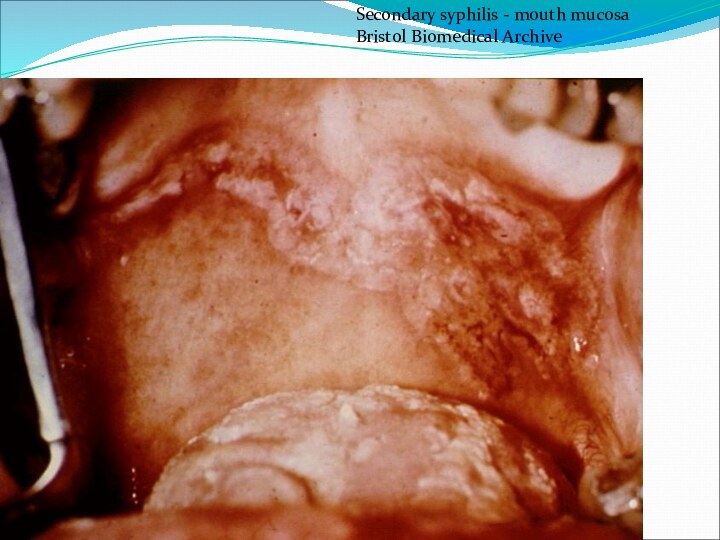
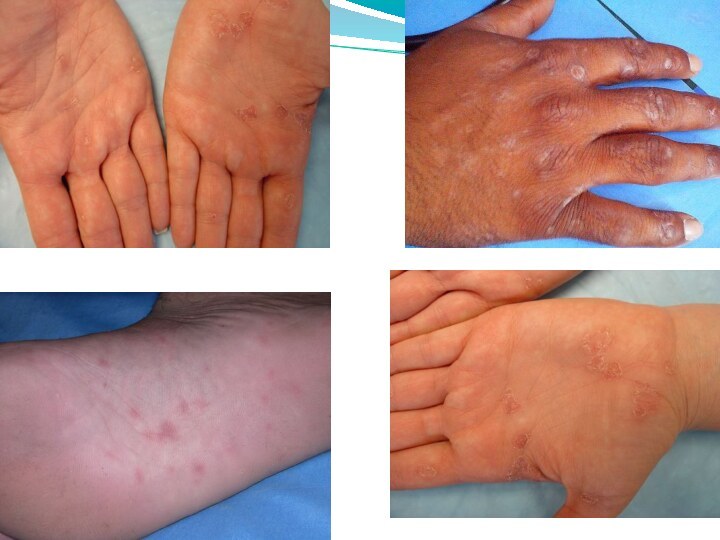
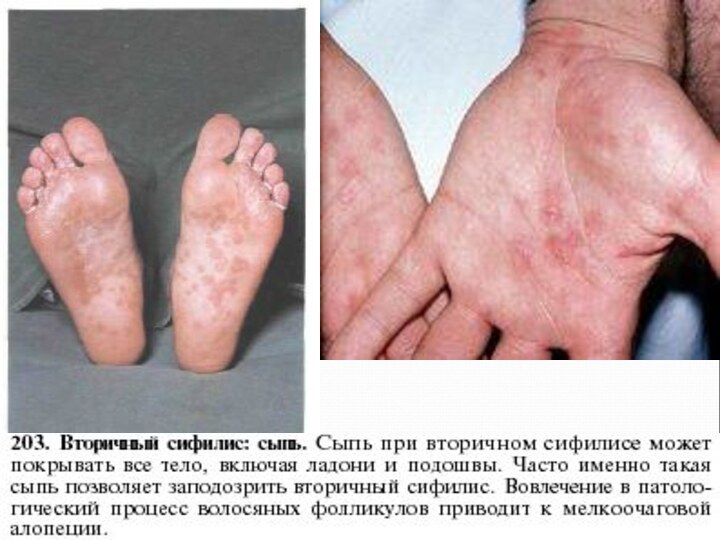
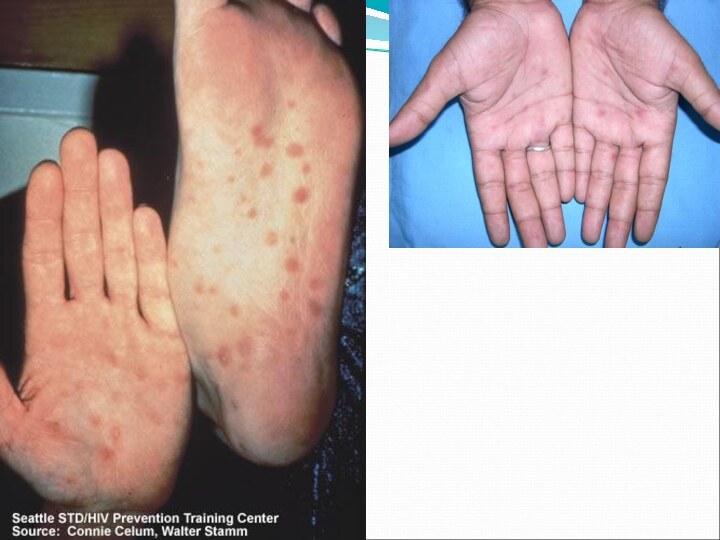
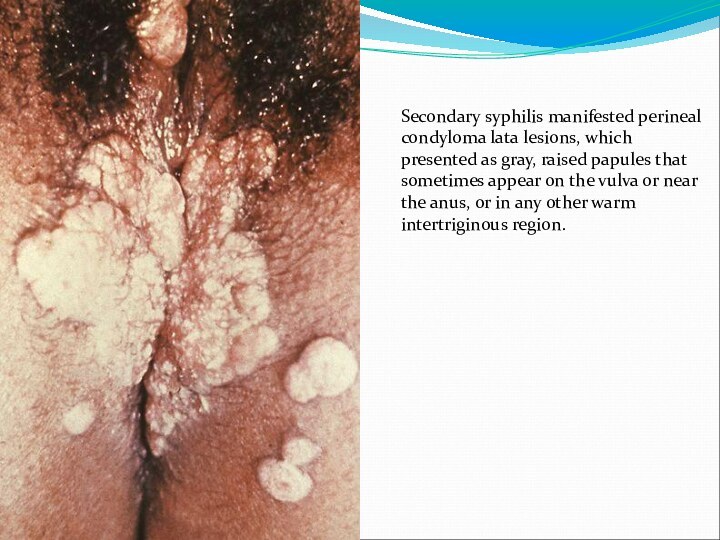
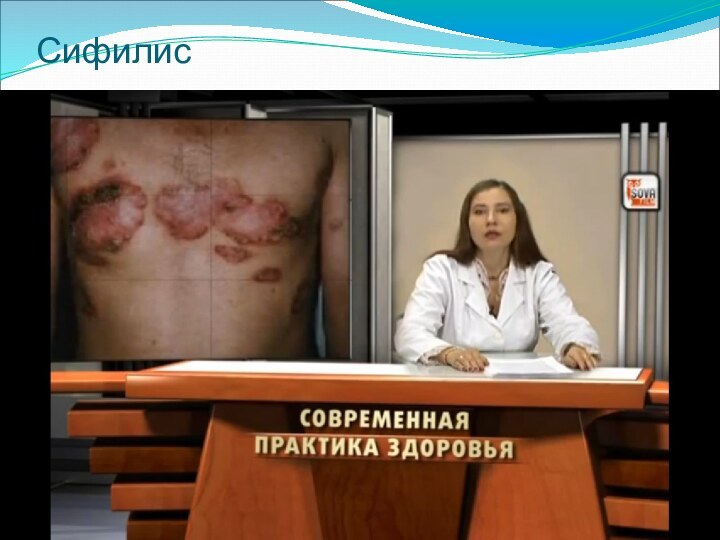

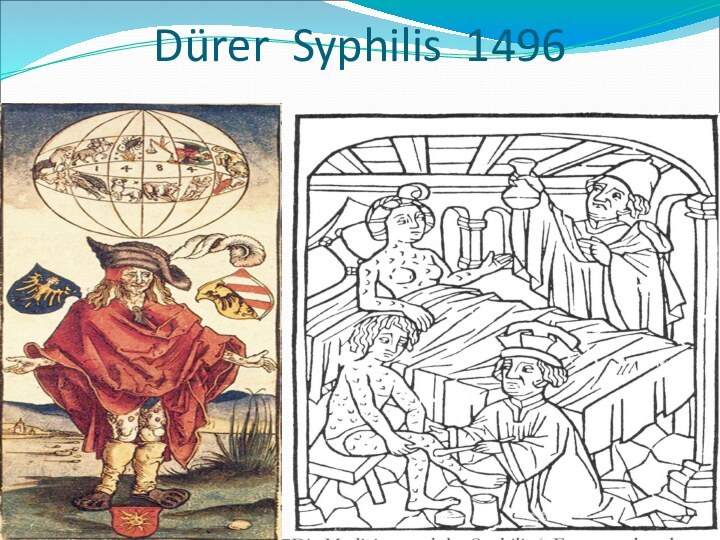


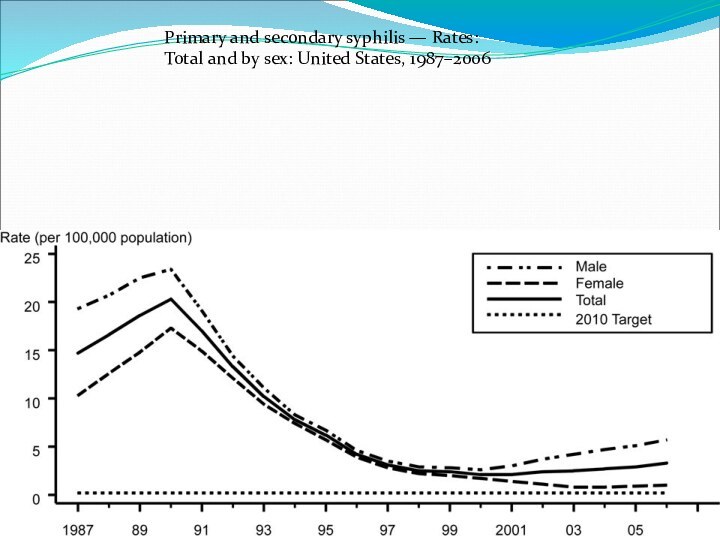
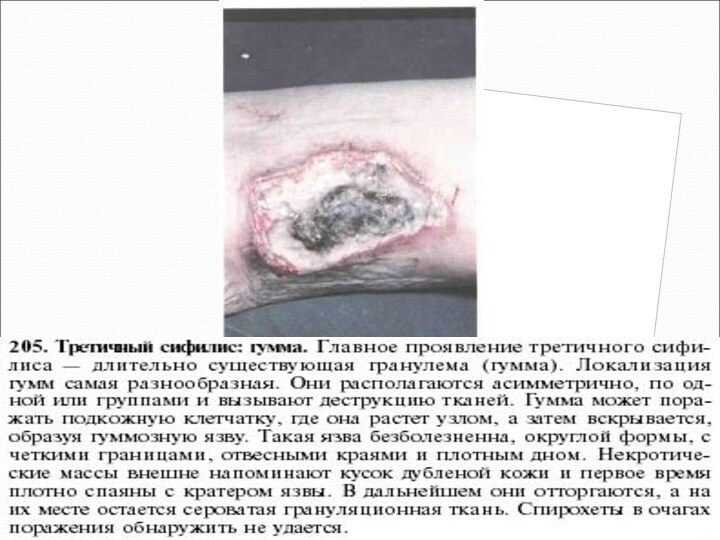
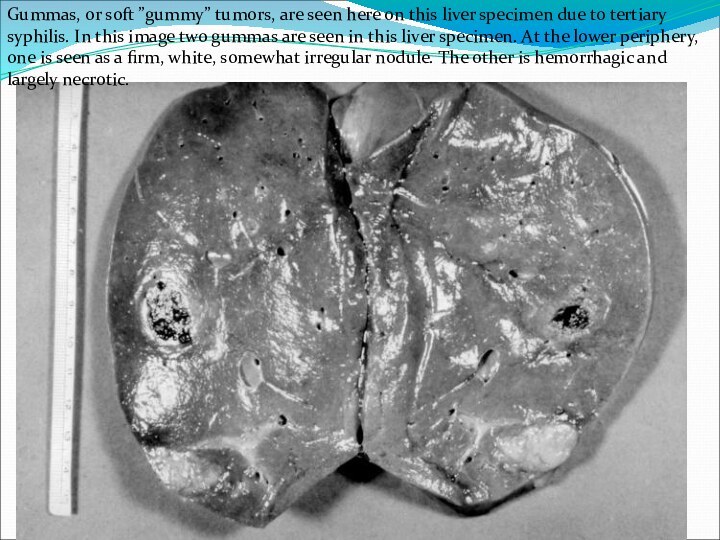
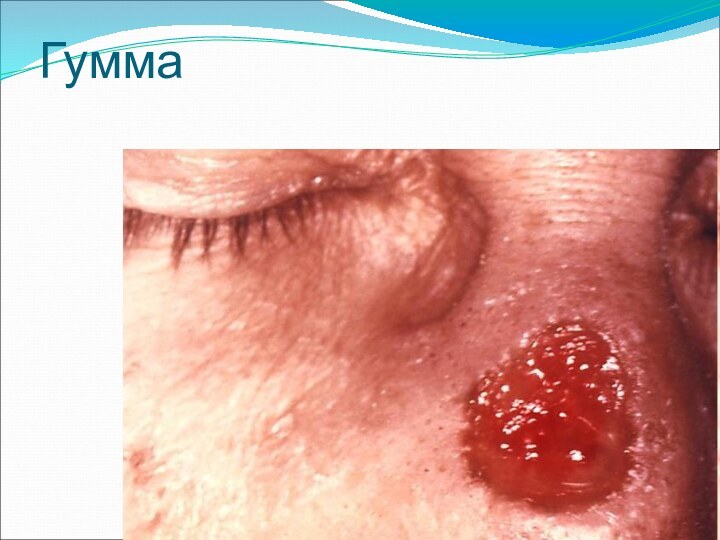
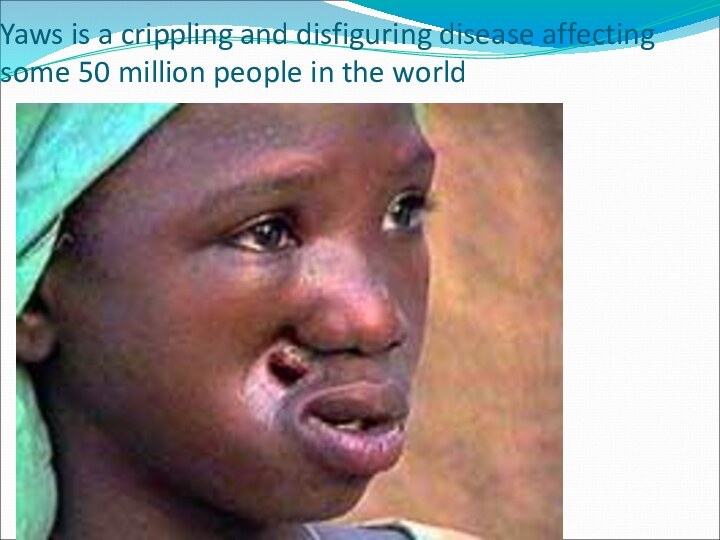
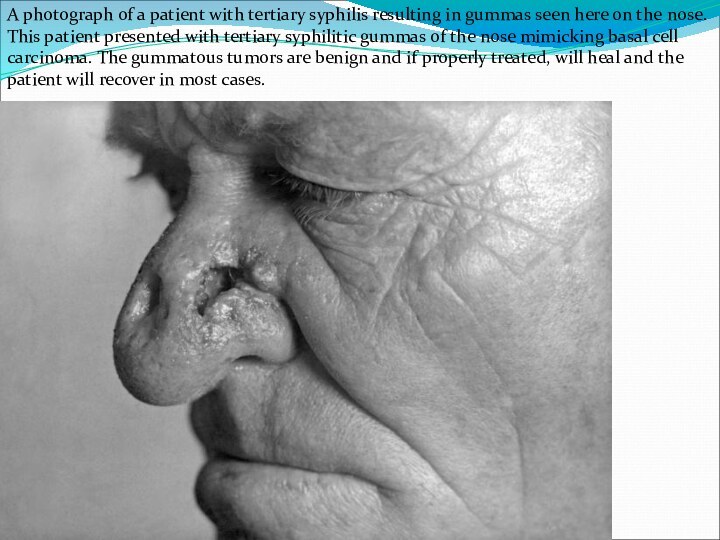

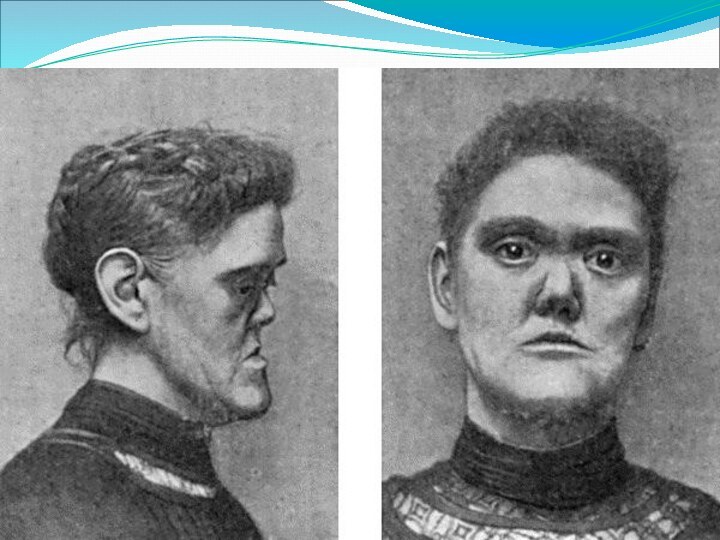
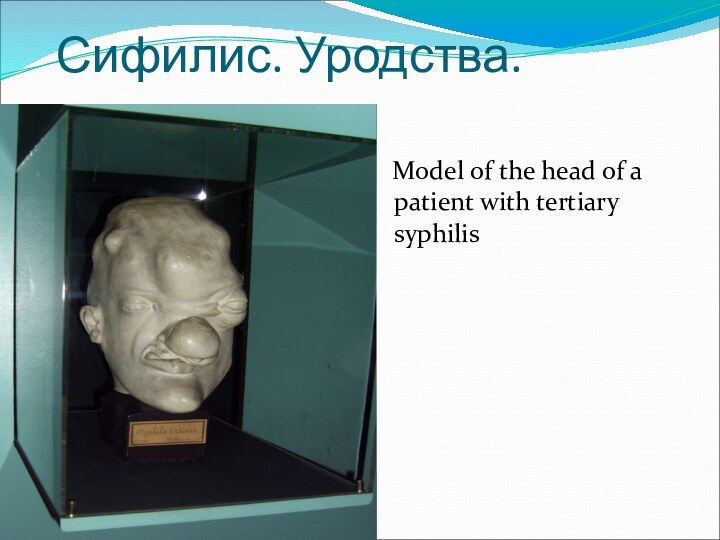
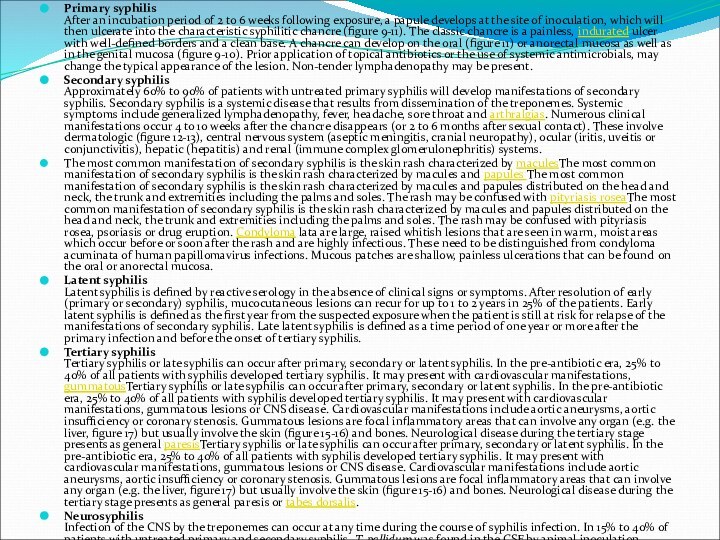
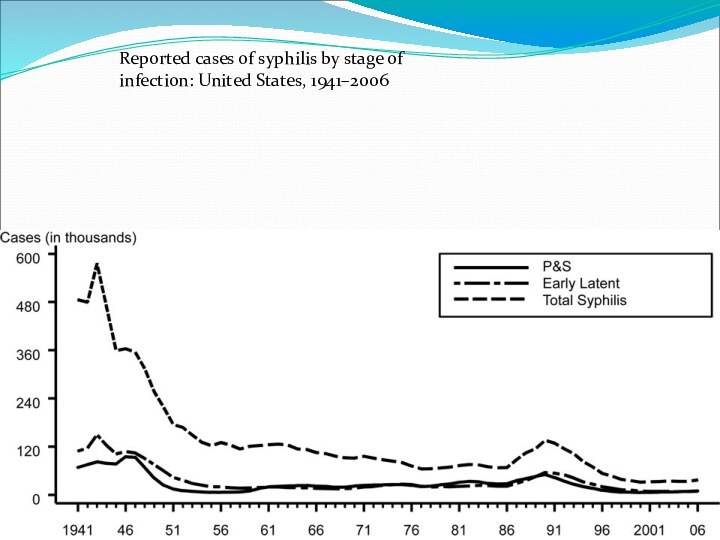

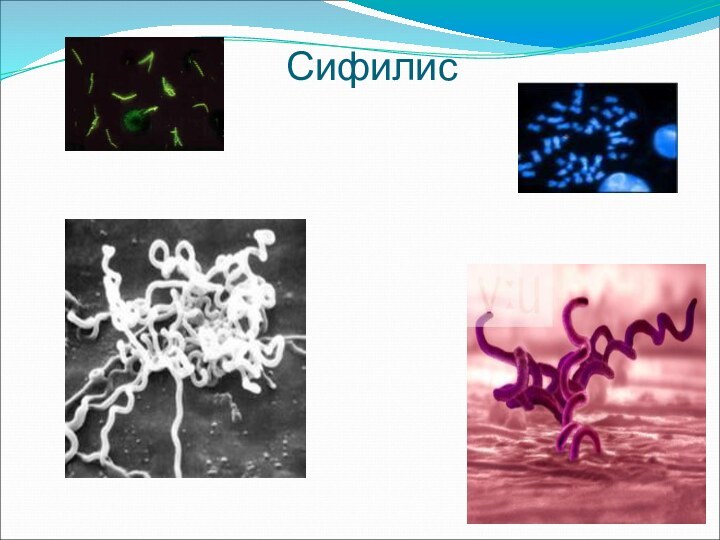
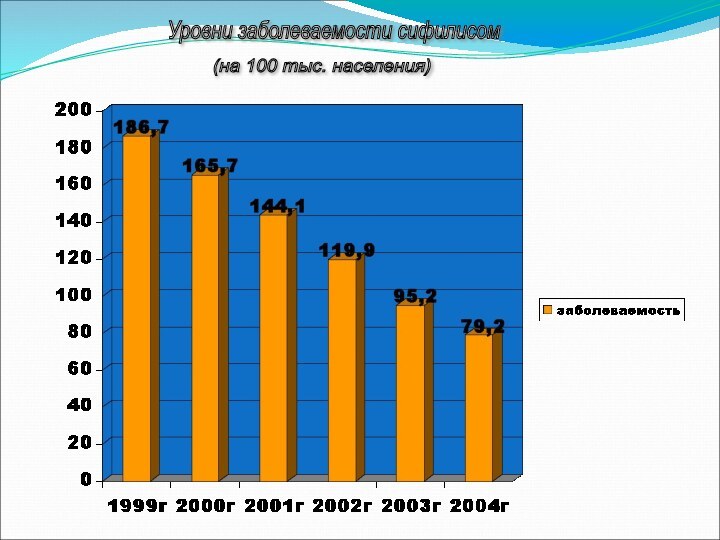
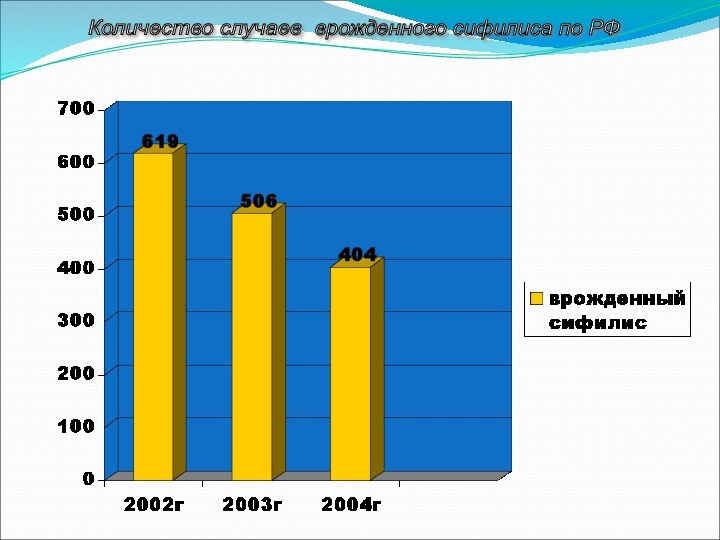
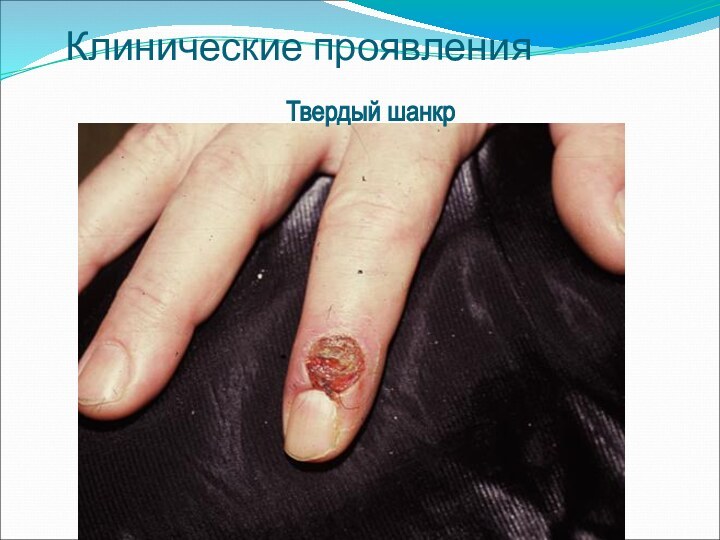
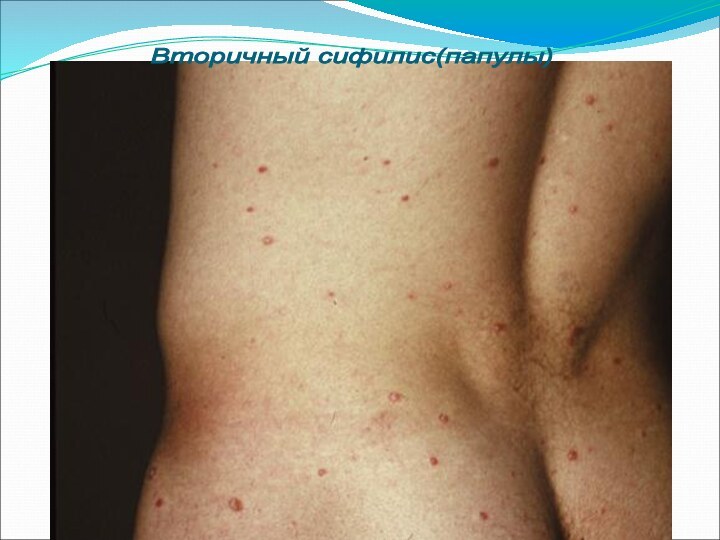
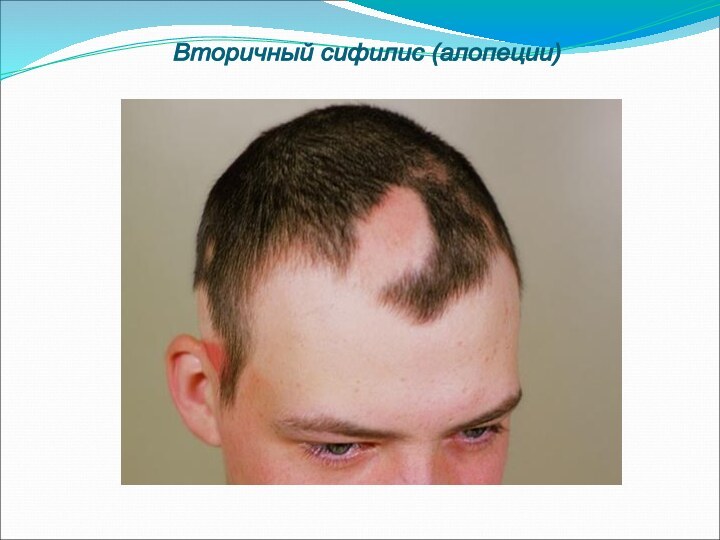
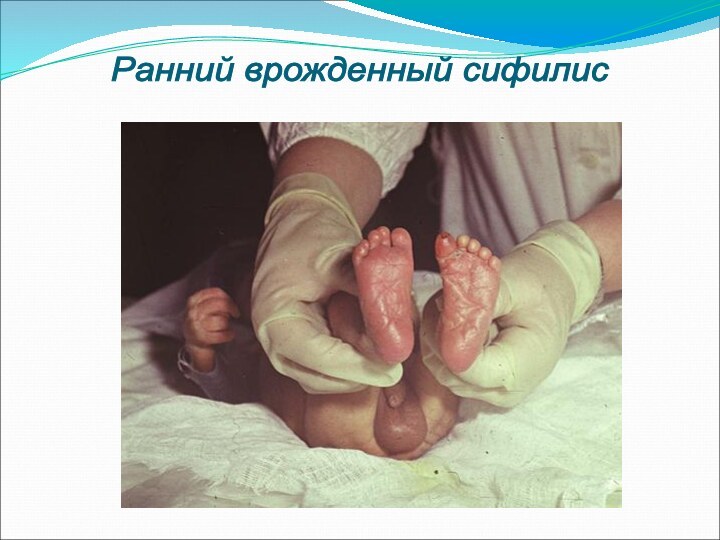
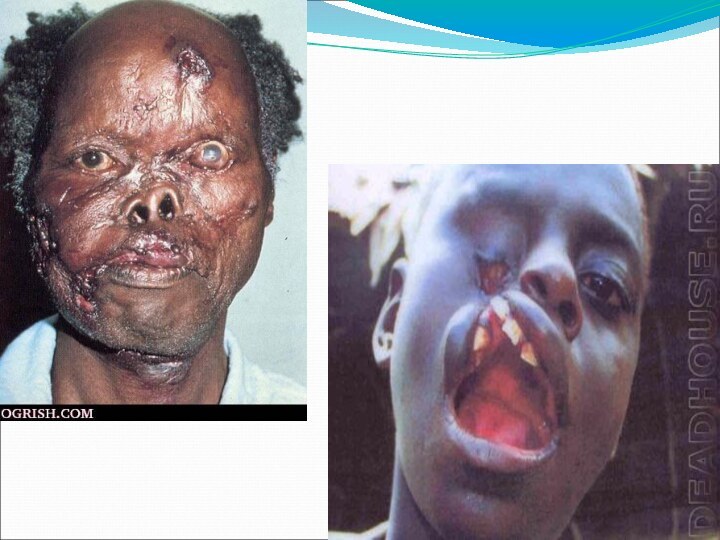
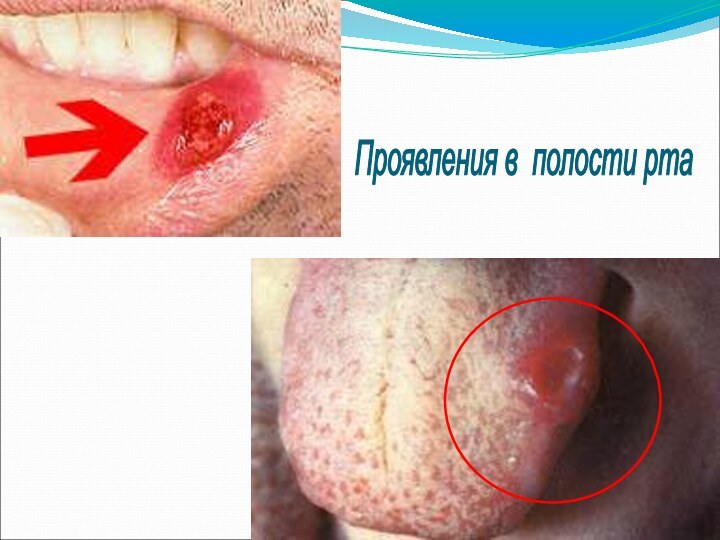
Слайд 5
http://info.fujita-hu.ac.jp/~tsutsumi/case/case133.htm
Бледные трепонемы
в межклеточном пространстве
Слайд 7 Transmission electron micrograph of Treponema isolated from a
bovine digital dermatitis lesion. The fixation treatment has resulted
in rupture of the outer membrane, releasing the periplasmic flagella from their tight association with the cytoplasmic cylinder.Слайд 10 Dark field photomicrograph of Treponema pallidum bacteria. Nichol's
strain of T. pallidum from a rabbit testicle, and
stained by fluorescent antibody techniqueСлайд 15 Diagnosis of syphilis The definitive diagnosis of primary syphilis
is made by visualization of treponemes by dark field
microscopy or by direct immunofluorescence (figure 18-19). The yield of these tests is high provided that (1) there is no prior topical or systemic antibiotic treatment and that (2) the examination is done by an experienced person. To obtain a specimen, the lesion can be gently abraded with gauze. The serous exudate is then applied to a glass slide. Direct or indirect immunofluorescence is recommended for oral lesions as non-pathogenic treponemes may be confused with T. pallidum on darkfield microscopy.Serological tests are the most widely used tests for syphilis and are categorized into treponemal and non-treponemal tests. The non-treponemal tests detect anti-cardiolipin antibodies and include RPR (Rapid Plasma Reagin), Toluidine Red Unheated Serum Test (TRUST) and Reagin Screen test (RST), VDRL (Venereal Disease Research Laboratory) and Unheated Serum Reagin (USR). The sensitivity of the non-treponemal tests varies from 70% in primary syphilis to 100% in secondary syphilis. These tests are advantageous because they are inexpensive, applicable for screening purposes, and their titers tend to correlate with disease activity. However, confirmation of the non-treponemal tests is necessary with the specific treponemal tests. The FTA-ABS (fluorescent treponemal antibody absorption test), the MHA-TP (microhemagglutination assay) and the TP-PA (particle agglutination assay) are 80% to 100% sensitive depending on the stage of disease. However, a positive MHA-TP alone does not establish the diagnosis of primary syphilis in a patient with genital ulcer, since the MHA-TP can remain positive for life. Patients suspected of having primary syphilis with a negative darkfield examination, negative RPR and MHA-TP should have follow up serologies in 2 weeks, since detection by direct microscopy depends on specimen collection and the expertise of the microscopist, and since serologies can be negative in the first two weeks after a chancre appears. False-positive non-treponemal and treponemal tests can occur in a variety of disease conditions including acute viral infections, autoimmune diseases, vaccination, drug addiction and malignancy.
Latent syphilis is diagnosed when a patient has a reactive RPR and a confirmatory test in the absence of signs or symptoms. The duration of disease from exposure can be estimated if the patient can recall specific signs or symptoms consistent with primary syphilis, has a history of exposure or previous serology. However, the usual scenario is that of a patient with positive serology and no clinical history suggestive of syphilis.
Слайд 17
Treponema hyodysenteriae
(возбудитель дизентерии свиней)
http://vetfak.nsau.edu.ru/new/uchebnic/microbiology/stu/index_micro.htm
Слайд 18
Treponema hyodysenteriae
(возбудитель дизентерии свиней)
http://vetfak.nsau.edu.ru/new/uchebnic/microbiology/stu/index_micro.htm
Слайд 24 Congenital syphilis, primary and secondary syphilis rates, by
year -- United States, 1992-1998. Epidemiology, surveillance.
Слайд 52 Secondary syphilis manifested perineal condyloma lata lesions, which
presented as gray, raised papules that sometimes appear on
the vulva or near the anus, or in any other warm intertriginous region.Слайд 60 Gummas, or soft ”gummy” tumors, are seen here
on this liver specimen due to tertiary syphilis. In
this image two gummas are seen in this liver specimen. At the lower periphery, one is seen as a firm, white, somewhat irregular nodule. The other is hemorrhagic and largely necrotic.Слайд 63 A photograph of a patient with tertiary syphilis
resulting in gummas seen here on the nose. This
patient presented with tertiary syphilitic gummas of the nose mimicking basal cell carcinoma. The gummatous tumors are benign and if properly treated, will heal and the patient will recover in most cases.Слайд 67 Primary syphilis After an incubation period of 2 to
6 weeks following exposure, a papule develops at the
site of inoculation, which will then ulcerate into the characteristic syphilitic chancre (figure 9-11). The classic chancre is a painless, indurated ulcer with well-defined borders and a clean base. A chancre can develop on the oral (figure 11) or anorectal mucosa as well as in the genital mucosa (figure 9-10). Prior application of topical antibiotics or the use of systemic antimicrobials, may change the typical appearance of the lesion. Non-tender lymphadenopathy may be present.Secondary syphilis Approximately 60% to 90% of patients with untreated primary syphilis will develop manifestations of secondary syphilis. Secondary syphilis is a systemic disease that results from dissemination of the treponemes. Systemic symptoms include generalized lymphadenopathy, fever, headache, sore throat and arthralgias. Numerous clinical manifestations occur 4 to 10 weeks after the chancre disappears (or 2 to 6 months after sexual contact). These involve dermatologic (figure 12-13), central nervous system (aseptic meningitis, cranial neuropathy), ocular (iritis, uveitis or conjunctivitis), hepatic (hepatitis) and renal (immune complex glomerulonephritis) systems.
The most common manifestation of secondary syphilis is the skin rash characterized by maculesThe most common manifestation of secondary syphilis is the skin rash characterized by macules and papules The most common manifestation of secondary syphilis is the skin rash characterized by macules and papules distributed on the head and neck, the trunk and extremities including the palms and soles. The rash may be confused with pityriasis roseaThe most common manifestation of secondary syphilis is the skin rash characterized by macules and papules distributed on the head and neck, the trunk and extremities including the palms and soles. The rash may be confused with pityriasis rosea, psoriasis or drug eruption. Condyloma lata are large, raised whitish lesions that are seen in warm, moist areas which occur before or soon after the rash and are highly infectious. These need to be distinguished from condyloma acuminata of human papillomavirus infections. Mucous patches are shallow, painless ulcerations that can be found on the oral or anorectal mucosa.
Latent syphilis Latent syphilis is defined by reactive serology in the absence of clinical signs or symptoms. After resolution of early (primary or secondary) syphilis, mucocutaneous lesions can recur for up to 1 to 2 years in 25% of the patients. Early latent syphilis is defined as the first year from the suspected exposure when the patient is still at risk for relapse of the manifestations of secondary syphilis. Late latent syphilis is defined as a time period of one year or more after the primary infection and before the onset of tertiary syphilis.
Tertiary syphilis Tertiary syphilis or late syphilis can occur after primary, secondary or latent syphilis. In the pre-antibiotic era, 25% to 40% of all patients with syphilis developed tertiary syphilis. It may present with cardiovascular manifestations, gummatousTertiary syphilis or late syphilis can occur after primary, secondary or latent syphilis. In the pre-antibiotic era, 25% to 40% of all patients with syphilis developed tertiary syphilis. It may present with cardiovascular manifestations, gummatous lesions or CNS disease. Cardiovascular manifestations include aortic aneurysms, aortic insufficiency or coronary stenosis. Gummatous lesions are focal inflammatory areas that can involve any organ (e.g. the liver, figure 17) but usually involve the skin (figure 15-16) and bones. Neurological disease during the tertiary stage presents as general paresisTertiary syphilis or late syphilis can occur after primary, secondary or latent syphilis. In the pre-antibiotic era, 25% to 40% of all patients with syphilis developed tertiary syphilis. It may present with cardiovascular manifestations, gummatous lesions or CNS disease. Cardiovascular manifestations include aortic aneurysms, aortic insufficiency or coronary stenosis. Gummatous lesions are focal inflammatory areas that can involve any organ (e.g. the liver, figure 17) but usually involve the skin (figure 15-16) and bones. Neurological disease during the tertiary stage presents as general paresis or tabes dorsalis.
Neurosyphilis Infection of the CNS by the treponemes can occur at any time during the course of syphilis infection. In 15% to 40% of patients with untreated primary and secondary syphilis, T. pallidum was found in the CSF by animal inoculation studies. Treponemal invasion of the CNS during untreated early syphilis may have the following outcomes: spontaneous resolution, asymptomatic neurosyphilis (at any time during syphilis infection), acute syphilitic meningitis (in the first year), meningovascular syphilis (5 to 12 years after primary infection), and parenchymatous neurosyphilis (18 to 25 years after primary infection).


